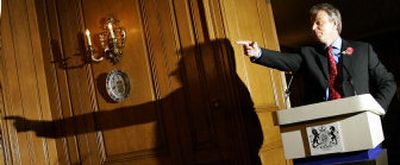U.S. power ‘seduced’ Tony Blair

LONDON – Prime Minister Tony Blair was so “seduced” by the “proximity and glamour of American power” that he failed to use his leverage with President Bush to slow the rush to war with Iraq, Britain’s former ambassador to the United States has written in a new book.
In “DC Confidential,” which British papers began serializing Monday, Christopher Meyer, who served in Washington from 1997 until February 2003, offers an insider’s look at the meetings between Blair and Bush during the lead-up to the war, which began a month after Meyer left the job. Meyer paints a critical picture of Blair as a leader who wasted his considerable clout as the United States’ key ally in the effort to remove Iraqi President Saddam Hussein.
With rare candor for a diplomat, Meyer writes that if Blair had bargained hard, he could have delayed the start of the war by insisting that the United States obtain a broader international mandate for the invasion of Iraq. He compared Blair’s actions with stronger negotiating efforts by Prime Minister Margaret Thatcher with Ronald Reagan, and Winston Churchill with Franklin D. Roosevelt.
Meyer said Blair also could have threatened to withhold British support unless the Bush administration had a clearer plan for postwar Iraq.
“We may have been the junior partner in the enterprise, but the ace up our sleeve was that America did not want to go it alone,” Meyer wrote, according to the serialized portions of the book, which will be published Thursday. “Had Britain so insisted, Iraq after Saddam might have avoided the violence that may yet prove fatal to the entire enterprise.”
In the excerpts, Meyer said he did not doubt that Blair sincerely believed Saddam needed to be ousted and that his decision to stand with Bush was made from “from the highest of high moral ground.” Meyer was privy to “a great deal of intelligence material in 2002” and said he was persuaded that Iraq had weapons of mass destruction. Still, he faulted Blair.
“Crucially, a slower timetable for war would have avoided that frantic search for a ‘smoking gun’ between December 2002 and the outbreak of the war” the following March, he wrote. “By going down that road, the Americans and British shifted the burden of proof from Saddam to themselves. We had to show that he was guilty. This turned out to be a strategic error, which to this day, in the absence of WMD, continues cruelly to torment Blair and Bush.”
Meyer’s charges were another setback for Blair, who has been increasingly criticized for his role in the unpopular Iraq war and has been losing support within his own party for his domestic agenda.
Blair at first refused to comment on the book when asked about it at a news conference Monday, saying, “I have nothing to say at all. … Except to say that I’m not getting into book promotion.”
But later in the hour-long news conference he said, “If you look at what happened in March 2003, I think you will see that I made the most strenuous efforts to get a second U.N. resolution and to end up with a second resolution that would have given us more time. The fact is, we couldn’t get one, we couldn’t get one for a very simple reason: The French made it clear that they would veto any such resolution. That is the reason why in the end you had to make a choice, and there was no other way.”